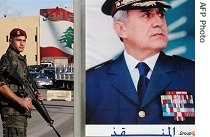A political stalemate in Lebanon that started at the end of 2006 has dragged on through the entire year, culminating in a crisis that has left the country without a president. VOA Middle East Correspondent Challiss McDonough reports from our bureau in Cairo.
As the year opened, Lebanon was in crisis. Opposition protesters were camped outside the prime minister’s office, demanding the government’s resignation. Opposition ministers had walked out of the Cabinet, and parliament did not convene for nearly a year.2007 culminated in a crisis over the presidency that has left Lebanon without a head of state since late November, when former President Emile Lahoud’s term expired.
The two sides have agreed in principle about who should be the next president, current Army chief, Gen. Michel Suleiman. But his election in parliament has been repeatedly delayed as the political leaders bicker over the same issues that divided them back in January, the shape of the next government, and the opposition’s role in it. "The situation is very depressing right now in Lebanon, because you can see that the entire political leadership has decided it is OK to be without a president, and that it is OK to be in this constant state of political paralysis for months on end," said Mohamad Bazzi, a visiting fellow on Middle East studies at the Council on Foreign Relations.
Political science professor Bassel Salloukh of Lebanese American University says Lebanon is entering what appears to be a period of perpetual crisis, where battles break out over every decision, corroding an already fragile state.
"When you look at the past year, the greatest lesson that you come out with is how institutions decay, and how the decay of these institutions bring the state to the verge of collapse," he said. "The ministries are still working, but the government as a forum for sectarian accommodation and sectarian peace is not functioning. And I think it will take us a very long time to undo the damage that has been done in the past year."
Since 2005, a string of political assassinations has kept Lebanon on edge. Lebanon was only beginning to recover from years of Syrian domination when a war between Hezbollah and Israel broke out in 2006. And the recovery from that war had barely begun when the political crisis exploded.
Bazzi says the continuing crisis is pushing the country into a downward spiral.
"It scares away investment. It scares away tourists. It scares away all the things that Lebanon needs to get back on its feet, especially after the devastating war in the summer of 2006," he added.
Salloukh says Lebanon’s political leaders have squandered the opportunity presented to them by the withdrawal of Syrian troops in 2005. They could have built a democratic, inclusive and multi-sectarian Lebanon, but instead have clustered around their own narrow sectarian interests.
"And the price has been paid in terms of democracy in the country, and in terms of independence," he noted. "We neither have a democratic system today, nor sovereignty and independence."
 |
| Smoke billows from the besieged Palestinian camp of Nahr al-Bared in north Lebanon, 19 Aug 2007 |
As the political leaders squabble, other problems facing Lebanon go unaddressed. One of them exploded into violence in May, when the Lebanese army began fighting a group of Islamic extremists inside the Nahr al-Bared Palestinian refugee camp.
After four months, the army routed the group, known as Fatah al-Islam, but only after heavy casualties on both sides and the destruction of much of the camp.
Bazzi says the squalid conditions and isolation of the Palestinian refugee camps in Lebanon have allowed them to become havens for Islamist extremists, most of whom are not Palestinian.
"And that’ is a problem that is not going to go away with the selection of a new president," he explained. "That is actually one of the things that is going to haunt the next president and the next prime minister and the next political leadership, and the Lebanese political leadership really needs to do something about the problem of Palestinian refugees and their treatment as second- and third-class citizens in Lebanon."
Another issue looming over the country is the Iraqi refugee crisis. Lebanon hosts about 50,000 Iraqis, most of them in the country illegally. That is a far smaller number than other countries in the region, but Lebanon is already so fragile that it remains a matter for concern, and Lebanon’s government has not come up with a cohesive policy for dealing with it.
The group Human Rights Watch also issued a critical report in December, saying Lebanon has detained nearly 600 Iraqis for being in the country illegally, and then given them an impossible choice – go back to Iraq, or stay in jail in Lebanon.
But Human Rights Watch researcher Nadim Houry says the political crisis in Beirut has made it hard for groups such as his to prod the government into action.
"I mean, that has been one of the challenges of working Lebanon this past year, as state institutions are mostly paralyzed," said Houry. "They recognize that the situation now is not ideal. The problem is, we need a bold political decision in Lebanon to come up with more creative solutions, and in the current vacuum, everything is immobilized. At the same time, we feel that we cannot put everything on hold until the political crisis gets resolved."
At its core, the analysts say Lebanon’s political crisis is a sectarian struggle for power between Sunni and Shiite Muslims, and that struggle intersects with a regional battle for influence between Iran and Syria on the one side, and so-called moderate Arab states, the United States, and Europe on the other.
 By Challiss McDonough,
By Challiss McDonough, 


